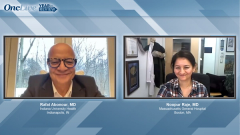
BCMA-Targeted CAR-T Therapies in Development and Future Perspective
Dr. Raje and Dr. Abonour provide an insightful reflections on unmet needs and future perspectives in Relapsed/Refractory Multiple Myeloma (R/R MM), offering a glimpse into the evolving landscape of myeloma care.
Episodes in this series

This is a video synopsis/summary of an OncLive® Post-Conference Perspective involving Rafat Abonour, MD, and Noopur Raje, MD.
Abonour and Raje close by discussing the abundance of B-cell maturation antigen (BCMA)–targeted bispecific T-cell engagers now available for relapsed/refractory multiple myeloma, including the 2 FDA-approved therapies, teclistamab and loncastuximab tesirine, along with linvoseltamab. Response rates are high across the various bispecifics.
The main toxicity requiring vigilant management is immunosuppression with risk for serious infections, even beyond the acute treatment period. Otherwise, bispecifics are very well tolerated, without cytokine release syndrome or neurotoxicity seen after the first couple of cycles.
Raje notes that determining optimal sequencing with other therapies remains an open question. After chimeric antigen receptor T-cell therapy, patients with relapsed disease can typically still benefit from bispecific treatment because BCMA antigen is usually still present. However, the converse may not hold true due to antigen loss after prolonged bispecific exposure.
In conclusion, Abonour and Raje express excitement about the future of BCMA-targeted immunotherapies for patients with multiple myeloma, with questions remaining regarding optimal dosing/scheduling and earlier positioning to further improve durability.
Video synopsis is AI-generated and reviewed by OncLive® editorial staff.





































